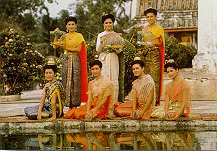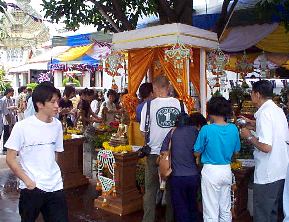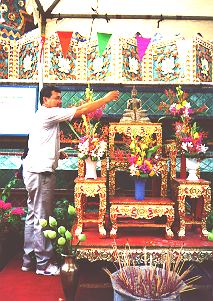 An elephant splashes water through its trunk on a group of revellers riding on a pick-up truck during the Songkran festival in Ayutthaya province, April 13, 1998
An elephant splashes water through its trunk on a group of revellers riding on a pick-up truck during the Songkran festival in Ayutthaya province, April 13, 1998
 Beauty women dressed in traditional Thai called Miss Songkran
Beauty women dressed in traditional Thai called Miss Songkran
|
- Songkran, is the ''Thai New Year''. Calculated by the lunar cycle, this year's date fell on April 13. Shortly
after dawn, devout Buddhists gather at the neighborhood temples to offer food for the monks and prayers for the New Year. By mid-morning,
though, the town degenerrates into a battlefield as the good people of Songkhla abandon themselves to a mad free-for-all orgy of throwing, squirting splashing,
heaving, hurling and dumping water on each other. Around streetcorner washtubs lurk little children, armed with water dippers, who gleefully ambush anyone foolhardy
enough to venture past. Teenagers on motorcycles weave wildly through traffic, ready to pounce in hit-and-run squirtgun raids. Pickup trucks packed with nubile schoolgirls,
fetchingly drenched, prowl about the streets in search of victims for a watery mugging.
|




